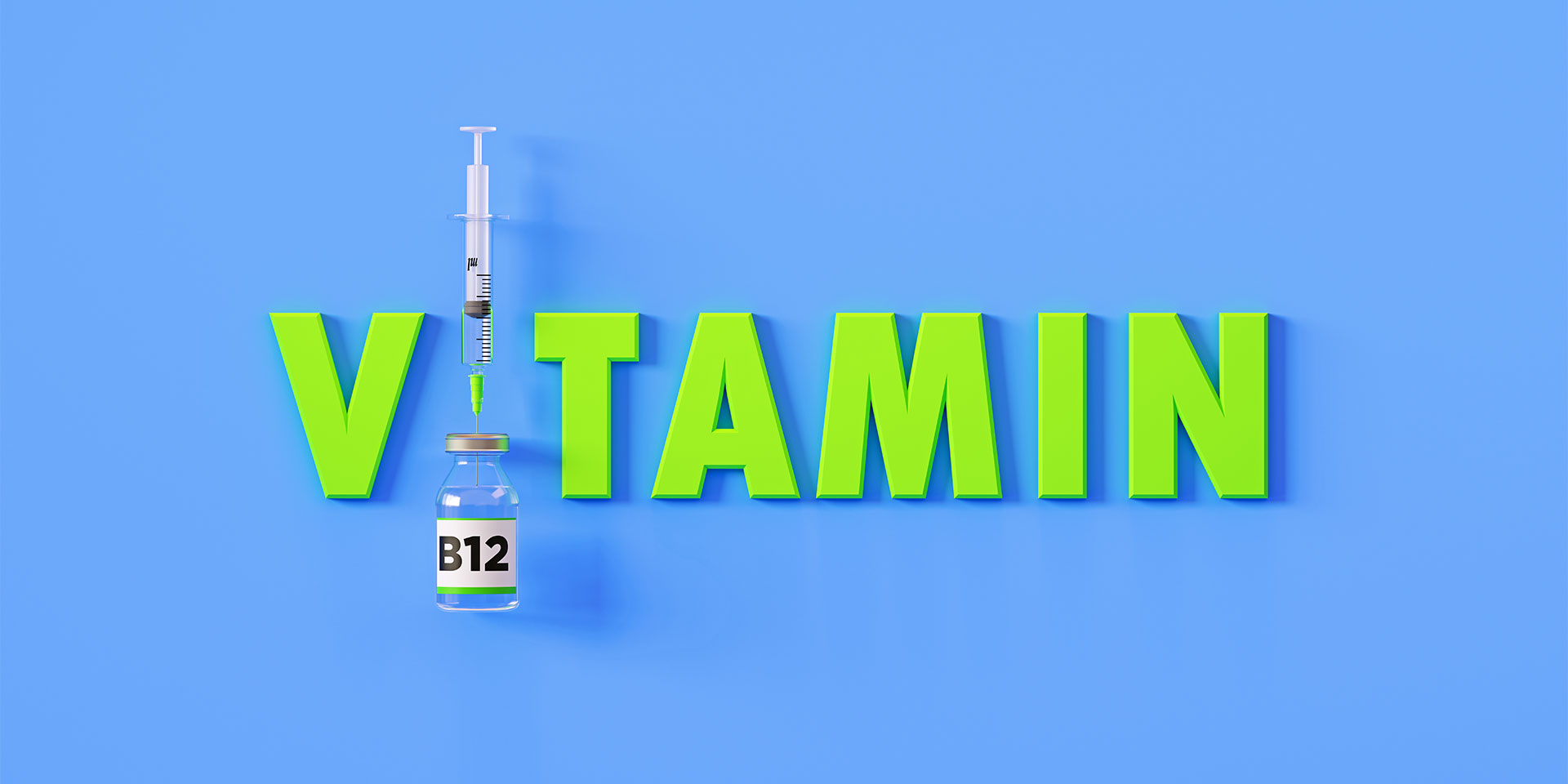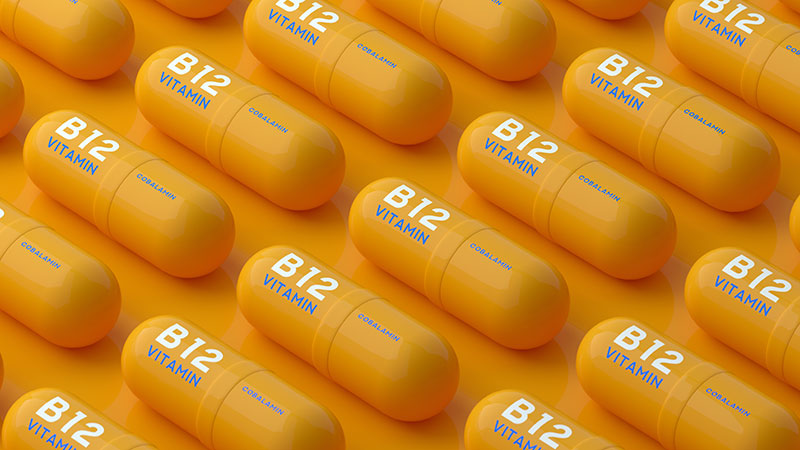The quantity of vitamin B12 required for a healthy diet is measured in micrograms, but the impact on human health is far greater than these tiny amounts would suggest.
We’ll call him David. The name is fictional, but the case is real: young (27), tall (over 1.8m), large (108 kg) but not fat, rather well-built due to weight-lifting. He did not smoke or drink alcohol. Despite this, for the fourth time in the last two months, David was rushed to the ER, where doctors told him, for the fourth time, that he had not had a heart attack. This, of course, was great news. But it would have been even greater if they had been able to tell him what was actually wrong with him.
At first, he had started to feel his hands and fingers getting numb. Then he had begun to feel chest pain: something like a claw in his chest preventing him from breathing properly. It was not long before that his mother had died from a heart attack and he feared the same might happen to him. This is what drove him to the hospital initially. Each time, though the doctors suspected that his heart was the problem area, the electrocardiogram showed there was nothing wrong with his heart. Blood tests ruled out a heart attack and the stress tests indicated that it was unlikely he would suffer one in the near future. Despite all this, no one was able to tell him what was wrong.
During the fourth visit, the doctor decided to hospitalize him in order to make a proper diagnosis and see what should be done further. The young resident who took care of him examined his hands and feet and the areas where he felt the numbness. Although they seemed normal, she noticed he could not perceive any sensation, and that when she hit his knee with the rubber hammer, the spontaneous movement that was supposed to follow did not occur: the patient had no reflex response. She told him to close his eyes and moved his toe up and down and asked him to tell her in which direction she had moved it. The patient was at a loss; he could not tell.
Going through the tests from one of David’s previous visits, the resident noticed his CBC showed a low level of red blood cells. The patient was anaemic. Investigating the cause of the anaemia, she discovered it was not sickle cell anaemia (a form of anaemia where the red blood cells are shaped like sickles), although two of his cousins had died from this rare disease. He had no congenital diseases and his levels of iron and folic acid were normal.
What the doctor discovered is that the levels of vitamin B12 in David’s body were surprisingly low: 10 times lower than the normal level. The mystery was practically solved and soon she was able to diagnose him with pernicious anaemia. The patient’s immune system was generating antibodies against a protein known as the intrinsic factor, which is essential for the absorption of vitamin B12 from food.
Because the intrinsic factor was inactivated by the antibodies produced by his own body, vitamin B12 could not be absorbed, and David’s symptoms were a direct consequence of this deficiency.[1] What is this vitamin B12, and who is in danger of suffering the consequences of being deficient in it?
What the doctor discovered is that the levels of vitamin B12 in David’s body were surprisingly low: 10 times lower than the normal level.
What is vitamin B12?
As its name suggests, it is a vitamin, which literally means “life amine,” implying that it is essential for life. Imagine four buildings forming a square in a city, and in the middle of the square, a tiny statue; this would be the chemical structure of the vitamin. Four organic cycles containing nitrogen (the buildings) and a cobalt atom (the miniature statue).
This is not a unique chemical structure, but there are at least four slightly different forms of the vitamin, all containing nitrogen (organic amine) and cobalt, being thus known under the category of cobalamins: hydroxocobalamin, cyanocobalamin, adenosylcobalamin and methylcobalamin, the last two being the active forms inside the cells (in other words, the first two are converted into the last two to be used by the body’s cells).[2]
The human body is incapable of producing vitamin B12. This is why it must be obtained from exogenous sources (sources outside the body), usually from food, and less often from food supplements or medicines (oral or injectable forms of the vitamin). Vitamin B12 is generally not found in plant-based foods, being the only vitamin which is found almost exclusively in animal products.
It must be mentioned that neither animals, nor plants or fungi, can biosynthesize vitamin B12. The only organisms that can form the vitamin are microscopic ones, like bacteria and archaebacteria, which have the necessary enzymes to obtain it, and the vitamin found in animal products is actually produced by these microorganisms.[3]
The human body is incapable of producing vitamin B12. This is why it must be obtained from exogenous sources (sources outside the body), usually from food, and less often from food supplements or medicines (oral or injectable forms of the vitamin).
Why is vitamin B12 important?
When the body has a deficiency of vitamin B12, due to the metabolic processes in which its presence is necessary, a substance called homocysteine will accumulate in the body, and DNA synthesis will slow down significantly, also slowing down the formation of new red blood cells (erythrocytes). This leads to the appearance of megaloblastic anaemia, a form of anaemia in which the erythrocytes are large, few, and ineffective (being too large, they cannot circulate through small vessels to transport oxygen). The formation of other cells is affected by the inhibition of DNA synthesis, such as leukocytes (white blood cells) or gastrointestinal epithelial cells.
Another role of vitamin B12 is to convert methyl malonic acid to succinic acid. In its absence, methyl malonic acid accumulates, which, together with homocysteine, is thought to contribute to myelin damage, a lipid-rich substance that isolates and protects the axon of the nerve cell.
Another role of vitamin B12 is to convert methyl malonic acid to succinic acid. In its absence, methyl malonic acid accumulates, which, together with homocysteine, is thought to contribute to myelin damage, a lipid-rich substance that isolates and protects the axon of the nerve cell. This way, vitamin B12 deficiency can cause negative neurological effects: neuropathy (nerve damage/alteration), ataxia (lack of coordination of movements), paresthesia (“tingling”), dementia, psychosis, and affective disorders. It has even been suggested that, in some cases, the symptoms of Parkinson’s disease may be caused exclusively by the lack of this vitamin.[4],[5] Epidemiological, clinical and neuroimaging studies have suggested that vitamin B12 deficiency is also involved in the onset and severity of psychiatric and neurodevelopmental disorders such as autism, depression or epileptic disorders.[6]
However, it should be noted that the symptoms of vitamin B12 deficiency can be polymorphic. For example, in 20-30% of vitamin deficiency cases, neurological symptoms do not coexist with megaloblastic anaemia. On the other hand, it is known that there are haematologically normal patients, without symptoms, but with low levels of the vitamin in their blood.[7]

How common is vitamin B12 deficiency, and who is most affected?
Epidemiological data obtained in the USA and the United Kingdom indicate that about 6% of people over 60 years of age have vitamin B12 levels which are below the reference value, and about 20% have a level below the amount that is considered normal. In developing countries, the prevalence is higher, as the deficiency manifests itself early in life and persists in later stages of existence.[8] More recent data suggests that between 2.5 and 26% of the general population has a sub-clinical (non-symptomatic) deficiency in vitamin B12, depending on the threshold used for classification, but it is not clear to what extent this unaccompanied deficiency is relevant for the long-term health of the individual.[9]
Several categories of people run an increased risk of vitamin B12 deficiency. Numerous observational studies have indicated that somewhere between 5 and 40 percent of elderly people are affected. This proportion varies according to the reference values and methods of investigation used, but is certainly higher in institutionalized elderly people.[10],[11],[12] In general, this deficit in the elderly is linked to a decrease in acid secretion in the stomach, the acid in the gastric juices being necessary to release the vitamin from the proteins to which it is bound in food.[13]
A decrease in gastric acidity can also be induced through drugs administered for this purpose to people with various gastric disorders (gastritis, gastroduodenal ulcer, etc.). These drugs are known as proton pump inhibitors (e.g. omeprazole), and the effect is similar in the sense that it decreases the absorption of the vitamin.[14]
Patients with bariatric surgery (for the treatment of obesity by altering the anatomy of the gastrointestinal tract) usually suffer from a lack of this vitamin, although the frequency and severity depend on the surgical technique used.[15],[16] There are several technical options for performing these surgeries on obese patients, because vitamin absorption is affected by these changes.
There is reasonable evidence to show that patients with type II diabetes who use metformin (the most common oral antidiabetic medicine) tend to have lower levels of vitamin B12 after a few months of treatment than those who do not use it.[17] Co-administration with proton pump inhibitors further increases the risk of deficiency[18].
A vitamin B12 deficiency can occur in a variety of conditions, from pernicious anaemia (an autoimmune gastritis) to congenital errors of vitamin metabolization, or from pancreatic to thyroid disorders.[19],[20]
A special category of patients who may suffer from hypovitaminosis B12, not due to pathological causes, but due to a deficit in food intake, is represented by those with a strict vegetarian (vegan) diet.
In some cross-sectional observational studies, levels of vitamin B12 deficiency biomarkers have been reported in a much higher proportion for vegetarian patients than for those with omnivorous diets. In a study in Germany, for example, 15% of the subjects in the omnivorous control group had a high level of homocysteine in their blood, compared to 36% of vegetarians (8% of the subjects in the control group had an elevated level of methyl malonic acid compared to 60% among vegetarians, and 13% of the control group had a low level of holotranscobalamin II, a subfraction of the vitamin that functions as a more sensitive index of deficiency, compared to 72% of vegetarians).[21]
In a meta-analysis, out of 17 identified studies (with 3,230 participants), only two studies reported no differences in homocysteine and vitamin B12 levels between vegans and omnivores.[22] However, an increased level of homocysteine is associated with an increase in cardiovascular risks. It is known that vegetarians generally have a better profile for cardiovascular risk factors: serum lipids, blood pressure, blood sugar, and body weight.
Some studies, but not all, have reported cardiovascular benefits of the vegetarian lifestyle. It is assumed that the studies that have not identified a cardiovascular benefit of vegetarian diets did so due to vitamin B12 and homocysteine levels. Even in studies that reported cardiovascular benefits, the beneficial effect was not as great as expected, which could be related to the same cause.[23]
What to do?
For people who are already at risk of developing vitamin B12 deficiency, and especially for those who have already developed the deficiency, the administration of the vitamin in the form of food supplements or medicine is necessary. The dose that needs to be administered varies according to the severity of the deficiency, but the general recommendation is 1,000 micrograms per day orally, 1,000 micrograms once a month by intramuscular injection, 1,000-3,000 micrograms every 6-12 months intramuscularly, or 500 micrograms weekly via the intranasal route.[24]
Intramuscular administration has traditionally been considered the “gold standard” in the administration of vitamin B12, and continues to be important, especially in very ill patients with gastrointestinal intolerance or who do not follow regular oral treatment.[25] However, more and more data suggests that, for most patients, oral administration may be equally effective when compared to the injection, which is much more expensive and uncomfortable.
Unfortunately, the “gold standard” remains the best known and practiced method, ignoring this new set of data that allows a cheaper, more convenient, and less risky administration for the patient. For instance, an article published in 2013 found that, although the first publication showed oral vitamin B12 supplements were as effective as injections in 1998, a survey of Canadian physicians in 2007 found that only a quarter of them were aware of the clinical trial and only 5.6% of Canadian physicians actually used oral vitamin B12 as an alternative to intramuscular injections.[26]
Unfortunately, the “gold standard” remains the best known and practiced method, ignoring these new data that allow a cheaper, more convenient, and less risky administration for the patient.
In 2013, three randomized, controlled clinical trials were available, all indicating similar efficiency of oral vitamin B12 supplementation. Subsequently, other studies have been published, indicating that supplementation in an appropriate oral dose (1,000 micrograms) is sufficient to prevent vitamin deficiency for most patients.[27],[28]
When it comes to people with a strictly vegetarian (vegan) lifestyle, or even a lacto-vegetarian or lacto-ovo vegetarian diet, the official position of government associations and institutions in this regard is “categorical and unequivocal”: vitamin B12 supplements are needed unless regular sources of vitamin B12 (milk, eggs, vitamin B12-fortified foods) are regularly consumed.[29],[30] It is assumed that there are no absorption difficulties (the anatomy of the digestive tract being intact) for most people, so the daily use of oral food supplements is sufficient. Therefore, in studies evaluating vitamin B12 levels for vegans, the prevalence of vitamin deficiency was very low in subjects using oral supplements or vitamin B12-fortified foods.[31],[32] In general, oral vitamin B12 supplements are based on cyanocobalamin.
Fears of excess caused by repeated administration of these supplements do not seem to be justified, because vitamin B12 is a water-soluble molecule that is not passively absorbed, but absorbed through a transport system which easily reaches saturation. Once saturated, the transport system can no longer take up other molecules, so any excess is simply eliminated. Evidence for the safety of high doses of vitamin B12 was provided by a clinical study published four years ago, when a dose of 25 mg (25,000 micrograms) per day was injected for 10 days, followed by the injection of 25 mg (25,000 micrograms) per month, for another 5 months.
There were no side effects observed in 12 evaluable patients (treatment was stopped after two months for a patient with seborrheic dermatitis and after three months for a patient with a respiratory tract infection; they were thus not regarded as evaluable patients).[33] It is preferable to use products that contain only vitamin B12, and not supplements with multiple minerals and vitamins, which can affect the stability and absorption of cobalamin.[34],[35]
In recent years, data from scientific literature shows that a small number of plant-based foods have a limited content of vitamin B12. Although for some time it has been thought that these are potentially inactive vitamin B12 analogues, it seems that these compounds are active and may contribute to vitamin B12 requirements. What are these foods? Broccoli, asparagus, or legume sprouts contain only traces of the vitamin. Tea (Chinese, Russian, green, black, etc.) contains only 0.1–1.2 micrograms/100g, so it cannot be considered a reliable source.
Various mushroom species also contain small amounts, ranging from 0.09 to 5.6 micrograms per 100g of dried mushrooms (the highest level is found in shiitake mushrooms). Some (edible) green algae also contain small amounts of vitamin B12, but cyanobacteria such as “spirulina” (and others) seem to contain only pseudo-vitamin B12 (structurally related compounds, but inactive). Some fermented products (for example, a food made from fermented soy, called tempeh) may contain between 0.7 and 8.0 micrograms per 100 g of food.[36],[37]
It should be noted that in all these cases the vitamin content can vary considerably and is relatively low. These are therefore unreliable sources of vitamin B12 which do not eliminate the need to use dietary supplements. The highest level of vitamin B12 in this food group (8 micrograms per 100 g) was recorded in soy-based fermented products. However, the position of the American Dietetic Association is that “fermented soy products cannot be considered a reliable source of active vitamin B12.”[38]
Conclusion
The quantity of vitamin B12 our diets require is measured in micrograms, but the impact on human health is far greater than these tiny amounts would suggest. Some people run a higher risk of vitamin deficiency, which can have catastrophic health consequences. For most people, including vegetarians, regular (daily) use of oral vitamin supplements may be sufficient to prevent deficiency.
Robert Ancuceanu, PhD, is a professor in the Faculty of Pharmacy at the Carol Davila University of Medicine and Pharmacy in Bucharest, Romania.



















